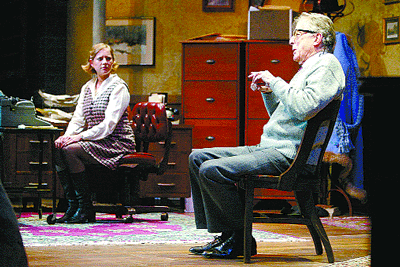Playwright stages autobiographical account of serving with W.W. II-era figure
He was 81. She was 25. Well, in cold fact, “I was a little older than the girl in the play and had already had three children,” says Joanna McClelland Glass, while the girl in the play, to whom the playwright has given the name of Sarah, is 25 and pregnant and unhappily married.
“Sarah with an ‘h’?” asks Francis Biddle, the octogenarian for whom she is about to go to work as secretary in his office up over the garage of his home in Georgetown. “Yes, sir,” the young woman respectfully answers.
There was indeed a real Francis Biddle (1886-1968), the attorney general under Franklin D. Roosevelt and, after the war, chief justice at the Nuremburg trials of Goering, Hess, and that lot.
In 1967, when Joanna McClelland Glass, the play’s Sarah, went to work for him, the distinguished old gentleman — a turn-of-century product of Groton and Harvard — was ailing and cranky and set in his ways and suffering intermittent memory loss while in complete austere command otherwise. He knew that death was closing in on him. He was also a grammatical purist. He was not, in short, the easiest man in the world to get along with.
Into this trying situation came a young independent-minded prairie woman from Saskatoon, Saskatchewan, Canada — “I mean, it’s not even near Chicago,” said Francis Biddle as he studied a globe — and she tried the best she could to (a) bring secretarial order into his life, and (b) survive it.”
“Trying” is also the name of the play, a quite beautiful couple of hours indeed, for all its well-trod path of age and youth in confrontation. Who, under the direction of Sandy Shinner, lifts the show at the Promenade well beyond the ordinary is that fine actor Fritz Weaver at the very top of his form as Francis Biddle, opposite newcomer Kati Brazda as strong-backboned Sarah with an “h” struggling to maintain her good humor and inborn respectful courtesy.
The better part of 30 years had to pass before the long-divorced Joanna McClelland Glass could go back to the one-act play she had once written about herself and Judge Biddle and turn it into a full-length work.
What got her re-started was the death, from prostate cancer, four years ago, after “a long relationship” between him and her, of Canadian actor George Sperdakos.
“There isn’t any question,” she said the other day over the phone from her home in Naperville, Illinois “but that the death of George — of my guy — gave me insight into the finality of it all. Of course I also have a lot more mileage on me now. All sorts of stuff simply could not have been there for a young person trying to write a one-acter. Over the last four years I sat down and did it.”
Early in “Trying,” the new secretary nudges Judge Biddle, who has been delinquent in sending some chapters to his publisher, Alfred A, Knopf. “Sir,” she says, “why don’t we write to the publisher, and apologize for the delay, and tell him that you’re back on track.”
“I don’t feel like it,” the old man grunts.
“I can tell you don’t, but sir, we are going to be absolutely defeated by this paperwork unless,” she says with fervor, “we lace the skates and hit the ice.”
Biddle looks at her, astounded. “That’s what all good Canadians would do,” he says at length.
“Yes, sir, all Canadians worth their salt,”
This Canadian worth her salt is the granddaughter of a woman who came as a homesteader across the prairies in a covered wagon.
“My father’s family came to Nova Scotia right after Waterloo. My mother, who’d been taken out of school to take care of the younger ones, was totally illiterate. Some of my earliest memories,” said playwright Glass, “are of being called to the phone because my mother was unable to read bills.
“There’s a sort of hunger there. If we had been Jewish or Lower East Side, it would have been: Oh, that immigrant climb! But, no, we were just Scotch Presbyterian.”
An earlier piece of hers, “Play Memory,” made an impressive debut at Houston’s Alley Theater and won a Tony nomination on Broadway in 1980, directed by Harold Prince, no less.
“Its only relation to ‘Trying” is that it was a very explicit study of an alcoholic father. He’s mentioned in ‘Trying.’”
Mentioned, and then some:
SARAH [who has just been verbally put down by Mr. Biddle]: Sir, my father was a bully. I vowed, when I left Saskatoon, that I’d never allow another person to bully me. Please do not ask me for personal information and then make snide remarks . . .
BIDDLE: Why did your father bully you?
SARAH: He was an alcoholic. He’d been fired from a rather prestigious position, and it seems that, with the loss of the job, he lost his identity.
BIDDLE: Not unusual. Equating oneself with a title is a particularly male affliction.
SARAH: Yes. He just locked himself in the house and drank. He actually bartered away the contents of our house for whisky . . . Winchester rifles. Golf clubs. Silverware. I started working part-time when I was 11 . . . My mother had to . . .
BIDDLE: Please, Sarah. On my knees, Sarah. Don’t tell me more. I’m sorry, but I no longer have the resources.
Saskatoon, says the real Sarah, “was not your typical prairie, wheat town. When in 1906, I think it was, the city of Regina became the capital of the province, the decision was made to give the University of Saskatchewan to Saskatoon.
“To a girl growing up, this meant specific cultural access to the British Commonwealth. It was not unusual to see turbaned men on the streetcars. You saw black people. You felt the class system in England — so paralyzing.”
She’d come to work for Francis Biddle through a curious chain of coincidences.
“I had had a very strange first job [after college] as quote, social secretary, unquote, to Mr. and Mrs. James Roland Angell. His wife was the dowager of New Haven society. Then I got a job in Washington, D.C., as secretary for a Mr. and Mrs. John Rood, who had a French couple working for them, Monique and Pierre.
“When the Roods went to Tobago, I got close with the French couple. Mrs. Rood was thrown out of a jeep in Tobago and was killed. Mr. Rood — sculptor and outdoor landscaper — came back to D.C. He sold their house, and I wasn’t going to go back to work; by then I’d had three children.”
But the difficulties in her marriage made it imperative for her to once more find employment.
With a “rather Victorian letter of recommendation” from Mr. Rood, she went to be interviewed by Mrs. Biddle. The interview went well. “I asked her who had recommended me, and it turned out to be the French servants, who now were working for the Biddles!”
She put Monique and Pierre into “Trying” — or, rather, Francis Biddle’s endless acid grumbling about Monique and Pierre’s perpetual request/demand that he, Francis Biddle, should pay for replacements of their worn and torn footwear.
Another long arm of coincidence would connect Joanna McClellan Glass to both Francis Biddle and Fritz Weaver.
“Lucy Kroll, who was everybody’s literary agent, and mine, and who died in 1997, had represented Mr. Biddle on a play he was trying to write about William Penn. She was also Fritz’s agent.”
The Glass creative dossier includes two novels (“Reflections of a Mountain Summer,” “Woman Wanted”) and a raft of much-admired plays, some having starred Colleen Dewhurst, Eva LeGallienne, Joan Plowright, Kiefer Sutherland, Holly Hunter, Michael Moriarty, and been directed by such as Austin Pendleton and Hal Prince.
It all began, she has told a Broadway.com interviewer, with “a first awkward stab at playwriting” — something called “Santacqua” — staged in 1969 at the Herbert Berghof Playwright’s Unit on Bank Street in Greenwich Village.
When a year later she wrote the first one-act, 45-minute version of “Trying,” Berghof sent it on to Alfred Lunt. She was in Detroit on a hot spring day making Kool Aid to pacify “three noisy children” when the phone rang. It was Alfred Lunt. He liked the play’s portrait of the “radical patrician” Francis Biddle, and would love to have played him, but, he said regretfully, “I’m going blind, and I bump into things.”
Fritz Weaver doesn’t bump into things. Does he look like Francis Biddle? “Only in his height.” Make that stature — as an actor. There’s a standing ovation for him every night. Francis Biddle would be horribly embarrassed, but in his heart of hearts the radical patrician might not be altogether displeased.



































